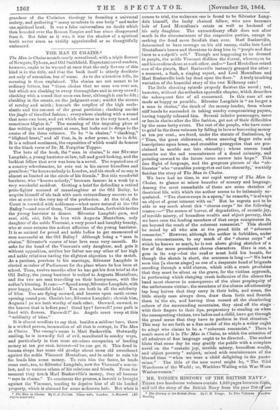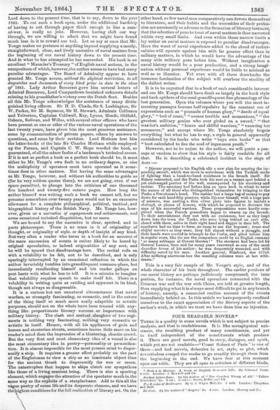MR. YONGE'S HISTORY OF THE BRITISH NAVY.* Timms two handsome
volumes contain 1,525 pages between th , and tell the story of the British Navy from the year 700 o our
• The llistory of the British Navy. By C. D Yew. In Two Volumes oudon IlentleT Lord down to the present time, that is to say, down to the year 1862. To cut such a book open, under the additional hardship of having to cut through paper thick enough to line a man- of-war, is really no joke. However, having cleft our way through, we are willing to admit that we might have found much less in it to reward our toil. Let us say at once that Mr. Yonge makes no pretence at anything beyond supplying a manly, straightforward, clear, and lively narrative of naval matters from the beginning of our naval history down to the present time. And in what he has attempted he has succeeded. His book is an excellent " Maunder's Treasury "of English naval actions, in the composition of which, however,the author seems to have had many peculiar advantages. The Board of Admiralty appear to have granted Mr. Yonge access, without the slightest restriction, to all despatches and documents of every kind prior in date to the close of 1841. Lady Arthur Somerset gave him several letters of Admiral Boscawen, Lord Camperdown furnished unknown details relating to his grandfather's victory over the Dutch fleet. Besides all this Mr. Yonge acknowledges the assistance of many distin- guished living officers. Sir H. D. Chads, Sir S. Lushington, Sir W. Parker, Sir M. Seymour, Sir H. Stewart, Admirals Collinson and Yelverton, Captains Caldwell, Key, Lyons, Mends, Oldfield, Osborn, Sulivan, and Willes, with several other officers who have been present at one or other of the various naval operations of the last twenty years, have given him the most generous assistance, some by communication of private papers, others by answers to questions, and some by their revision. Lord Hotham lent him the letter-books of the late Sir Charles Hotham while employed up the Parana, and Captain C. W. Hope weeded the book, so guaranteed, of all the minor faults of a landsman's technical errors. If it is not as perfect a book as a perfect book should be, it must either be Mr. Yonge's own fault in no ordinary degree, or else the multiplicity of operators must have operated as it some- times does in other matters. Not having the same advantages as Mr. Yonge, however, and without his authorities to guide us (for he very seldom quotes them), we are not going, even if our space permitted, to plunge into the criticism of one thousand five hundred and twenty-five octavo pages. How long the author himself was writing such a book we cannot tell, but we presume somewhere over twenty years would not be an excessive allowance for a complete philosophical, political, tactical, and biographical history of the British Navy. Mr. Yonge has, how- ever, given us a narrative of engagements and achievements, and some occasional technical disquisition, but no more.
We are bound to say the narrative is clear, spirited, and in parts picturesque. There is no trace in it of originality of thought, or originality of style, or depth of insight of any kind. But very often a reader who turns to a book for an account of the mere succession of events is rather likely to be bored by original speculation, or indeed originalities of any sort, and he will be spared that disadvantage here. The recital rolls on with a volubility to be felt, not to be described, and is only sparingly interrupted by an occasional reflection in which the author invariably tumbles into grandiloquent common-place, but immediately recollecting himself and his reader gallops on post haste with what he has to tell. It is a mistake to imagine that volubility requires speech to make itself felt. There is a volubility in writing, quite as rattling and apparent in its kind, though not always so disagreeable.
It is a curious but not unnatural circumstance that naval warfare, so strangely fascinating, so romantic, and in the nature of the thing itself so much more easily adaptible to artistic purposes, should not on the whole have been treated with any- thing like proportionate literary success or importance with military history. The clash and mutual slaughter of two regi- ments is nothing very fascinating, nothing very romantic or artistic in itself. Homer, with all his appliances of gods and heroes and stentorian shouts, sometimes leaves little more on his reader's mind than the impression of a blustering, chaotic crowd. But the very first and most elementary idea of a vessel is also the most elementary idea in poetry—personality or personifica- tion. It is almost impossible for the most prosaic mind to diaper- sonify a ship. It requires a greater effort probably on the part of the Englishman to view a ship as an inanimate object than for the ancient Greek to dispersonify the sun or moon. The catastrophes that happen to ships clutch our sympathies like those of a living sentient being. There is also a sporting element, which engages the attention of the spectator much in the Ise way as the exploits of a steeplechaser. Add to this all the v4as e poetry of ocean life and its desperate chances, and we have theitighest conditions for the full realization of literary art. On the other hand, so few naval men comparatively can devote themselves to literature, and their habits and the necessities of their profes-
sion are necessarily so adverse to the formation of literary instincts, that the selection of pens to treat of naval matters is thus narrowed within very small limits. And even within these narrow limits a
lay writer on naval matters is exposed to peculiar disadvantages. Here the want of naval experience added to the cloud of techni- calities will operate against him with far greater effect than in military matters, in which he would have the advantage of the many able military pens before him. Without imagination a naval history would be a poor production, and a strong imagi- nation without personal experience would be liable to mislead as well as to illumine. Yet even with all these drawbacks the immense fascination of the subject will overbear the sterility of the dullest writer.
It is to be regretted that in a book of such considerable interest and use Mr. Yonge should have dealt so largely in the hack style and hack epithets of the semi-grandiloquent fine phraseology of the last generation. Open the volumes where you will the most in- teresting passages become half repulsive by the constant use of expressions such as "pinnacle of human glory," "deeds of equal
glory," "bed of roses," "scenes terrible and momentous," "the
greatest military genius who ever girded on a sword," "that warder's ambition," "brave and skilful warriors," "vaunting her commerce," and except where Mr. Yonge absolutely forgets everything but what he has to say, a style in general apparently considered by the hacks who write "boys own books" as that "best calculated to fire the soul of ingenuous youth."
However, not to be unjust to the author, we will quote a pas- sage at random to show that his style is fairly readable for all that. He is describing a celebrated incident in the siege of Acre :—
" Djezsar proposed to his English ally a new plan for meeting the im- pending aesault, which was more in accordance with the Turkish mode of fighting than a hand-to-hand resistance in the breach itself. Sir Sidney consented, and the Pasha took his seat on a vacant spot behind a yet undamaged portion of the wall, accompanied by his secretary and cashier. The secretary had before him an open book in which to enter the names of all those who distinguished themselves by bringing to the Pasha a Frenchman's head. The cashier had a large bag of money to pay down for each head fifty piastres, while Djezzar himself, with a huge pair of scissors, was cutting a thin silver plate into figures to imitate a ehderagk, or plume of honour, with which he proposed to decorate the caps of his successful warriors. These preparations were hardly com- pleted when the French grenadiers began to swarm up the breach. To their astonishment they met with no resistance, but as they leapt down into the town the Turks, who were lying behind on each side, closed with them, sabre in their right hand and dagger in their left. The assailants had no time to form, no room to use the bayonet ; brave and skilful warriors as they were, they fell almost without a struggle, and their heads were carried in triumph to the Pasha, and piled before him in regular rows, like (to use the comparison made by an English seaman) so many cabbages at Covent Garden ! ' The stormers had been led by General Lannes, then and for many years renowned as one of the most dauntless heroes of his nation ; he was desperately wounded, and with difficulty saved by his men. Another general, Rimbaud, was killed. After suffering enormous loss the assailing columns were at last with- drawn."
This is a very fair sample of Mr. Yonge's style, and of the whole character of his book throughout. The earlier portions of
our naval history are perhaps judiciously compressed, the later portion, for instance, the naval operations connected with the Crimean war and the war with China, are told at greater length,
thus supplying what it is always most difficultto get in anybranch of history, namely, a connected routine account of the events immediately behind us. In this article we have purposely confined ourselves to the exact appreciation of the literary aspects of the
author's work, in which we trust we have done him no injustice.



































 Previous page
Previous page